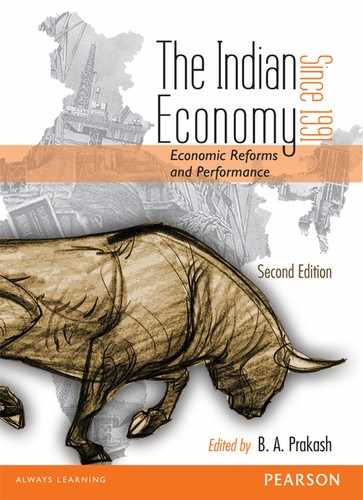Appendix 10
Economic Reforms, 2000–01
Industry
- Strong thrust to knowledge based industry by reducing customs duty on several items of IT, telecom and knowledge-based industries.
- Foreign direct investment permitted through automatic route in all industries except for a small negative list.
- Non-banking financial companies allowed to hold foreign equity up to 100 per cent if they are the holding companies. Their subsidiaries, which are the operating companies, also allowed to hold foreign equity up to 75 per cent.
- Dereservation of the garment sector from the purview of SSI reservation.
Infrastructure
- Securitization of dues of central sector power and coal utilities for assisting the SEBs in clearing dues.
- Domestic long-distance service opened up without restriction on the number of operators.
- Corporatization of Department of Telecom Services (DTS) and the Department of Telecom Operations (DTO) by creating the Bharat Sanchar Nigam Limited (BSNL) with effect from 1 October 2000.
- Revenue sharing regime, in place of existing fixed licence fee, introduced for both basic and cellular service operators.
- Thrust to accelerated implementation of Prime Minister’s National Highways Development Project (NHDP) through petrol and diesel cess and additional fund raising measures for the NHAI.
- Disinvestment of government equity proposed in Indian Airlines and Air India.
- Extension of tax holiday benefit to solid waste management and water treatment for developing urban infrastructure.
Direct Taxes
- Non-agricultural income of farmhouses made taxable.
- Venture capital funds accorded complete pass-through status with the income being taxed only in the hands of investors.
- Interest from bonds issued by local authorities, as specified by the central government, made tax free to make funds available for infrastructure.
- Minimum Alternate Tax (MAT) to be charged at 7.5 per cent of the ‘book profits’ by all companies as determined under the Companies Act instead of the effective rate of 10.5 per cent earlier.
- Tax holiday benefits liberalized in respect of newly established industrial undertakings in free trade zones, software technology parks, electronic hardware technology parks and 100 per cent export oriented undertakings.
- Weighted deduction for expenditure incurred on scientific research on in-house research and development facility enhanced from 125 to 150 per cent.
- Benefit of exemption of export income by entertainment industry extended to noncorporate assesses.
- ‘One-by-six’ criteria, introduced in the Union Budget 1998–99, for identifying potential taxpayers, extended to 79 more cities (from 54 cities) having population of 2 lakhs or more.
Indirect Taxes
- Peak protective customs tariff rate reduced from 40 per cent to 35 per cent ad valorem.
- The existing five major ad valorem rates of basic customs duty reduced to four ad valorem rates.
- The system of central excise was overhauled with the introduction of a single Central Value Added Tax (CENVAT) of 16 per cent ad valorem on all manufactured goods with a few exceptions.
Fiscal Management
- The Fiscal Responsibility and Budget Management Bill, 2000 was introduced in the Lok Sabha in December 2000. The proposed legislation provides for a legal and institutional framework to eliminate revenue deficit, bring down the fiscal deficit and stabilize debt as a proportion of GDP within a time frame.
- The interest rate on general provident funds reduced by 1 per cent to 11 per cent with effect from 1 April 2000.
- Several measures taken for controlling growth in non-plan, non-developmental expenditure.
Financial Sector
- Tightening of entry norms for IPOs through modifications to SEBI (Disclosure and Investor Protection) guidelines.
- Modified guidelines issued for 100 per cent one-stage book building process.
- Legislation initiated for reducing minimum government shareholding in nationalized banks to 33 per cent.
- Establishment of the IRDA.
- Enlargement of functional area and greater autonomy to the NABARD through amendment to the NABARD Act, 1981.
- Revised norms for entry of new banks in private sector.
- Permission to banks and NBFCs for undertaking insurance business.
Trade Policy
- Setting up of SEZs to encourage export production.
- Evolution of a scheme for granting assistance to states based on their export performance for development of export related infrastructure.
- Permission to import second hand capital goods, less than 10 years old without obtaining any licence on surrender of SIL.
Capital Account
- FDI up to 100 per cent permitted in e-commerce, subject to specific conditions.
- The dividend balancing condition for FDI in 22 consumer goods industries removed.
- The existing upper limit of Rs 1,500 crores for FDI in projects involving electricity generation, transmission and distribution (other than atomic reactor plants) dispensed with.
- FDI under the automatic route permitted up to 100 per cent for all manufacturing activities in SEZs, except certain activities.
- Foreign equity participation up to 36 per cent in insurance sector allowed under the automatic route.
- Policy liberalizations effected for facilitating the use of ECB as a window for resource mobilization.
- Policies pertaining to international offerings through ADR/GDR by Indian companies further liberalized.
Source: Economic Survey, 2000–01.
..................Content has been hidden....................
You can't read the all page of ebook, please click here login for view all page.
